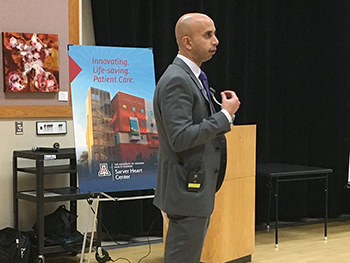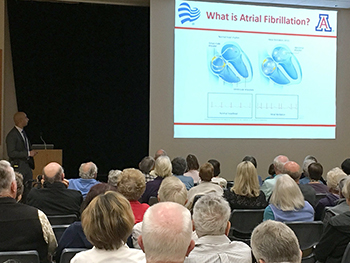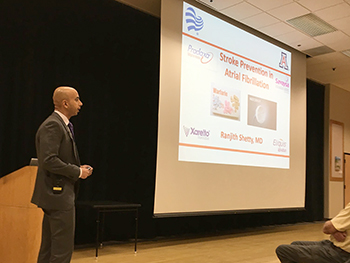 The University of Arizona Sarver Heart Center will continue its 32nd annual Green Valley Lecture Series on Thursday, March 21, at 10 a.m., with “Stroke Prevention and Atrial Fibrillation,” presented by Ranjith Shetty, MD.
The University of Arizona Sarver Heart Center will continue its 32nd annual Green Valley Lecture Series on Thursday, March 21, at 10 a.m., with “Stroke Prevention and Atrial Fibrillation,” presented by Ranjith Shetty, MD.
The lecture series is offered in cooperation with Green Valley Recreation, Inc. Lectures will be at Canoa Hills Social Center, 3660 S. Camino del Sol, Green Valley. The lecture series is free and open to everyone, and includes time for questions and answers. No reservations are required and refreshments are provided.
Atrial fibrillation is a heart arrhythmia that becomes more common as people age. People with atrial fibrillation can be at higher risk for stroke. Dr. Shetty will discuss who is at risk and what therapies prevent stroke in this population.
A few photos from March 21 Green Valley Lecture by Dr. Ranjith Shetty at the Canoa Hills Social Center (click image to enlarge):
Courtesy Katie Maass, Sarver Heart Center communications director, via Facebook.
Dr. Shetty is a member of the UA Sarver Heart Center and an assistant professor of medicine, associate director of the Structural Heart Disease Program and associate director of the Transcatheter Aortic Valve Replacement (TAVR) Program at the UA College of Medicine – Tucson.
Upcoming Green Valley Lectures include:
- April 18 – “Arthritis and Heart Disease: Is Inflammation the Common Culprit?,” Kent Kwoh, MD, director, UA Arthritis Center; chief, Division of Rheumatology; professor of medicine and medical imaging; and The Charles A.L. and Suzanne M. Stephens Endowed Chair in Rheumatology, UA College of Medicine – Tucson. This lecture is co-sponsored by the UA Arthritis Center.
For more information about the UA Sarver Heart Center, please visit heart.arizona.edu.
The University of Arizona Sarver Heart Center’s 150 members include faculty members from cardiology, cardiothoracic surgery, pediatric cardiology, neurology, vascular surgery, radiology, endocrinology, emergency medicine, nursing, pharmacy and basic sciences. The UA Sarver Heart Center emphasizes a highly collaborative research environment, fostering innovative translational or “bench-to-bedside” research and working toward a future free of heart disease and stroke. If you would like to give permission for Sarver Heart Center to contact you about heart research studies, please complete a Cardiology Research Registry Information Form. The academic mission of the Sarver Heart Center encompasses four fellowship programs in cardiovascular disease, interventional cardiology, advanced heart failure and transplant cardiology, and electrophysiology.




